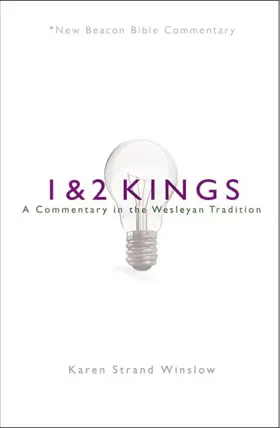

1 and 2 Kings: A Commentary in the Wesleyan Tradition
in New Beacon Bible Commentary
Pages
288
Publisher
Beacon Hill Press of Kansas City
Published
6/1/2017
ISBN-13
9780834135611
Engaging, perceptive, and academically thorough, the NEW BEACON BIBLE COMMENTARY will expand your understanding and deepen your appreciation for the meaning and message of each book of the Bible.
Spanning four hundred years, the books of First and Second Kings tell the stories of Judah's and Israel's rulers from the end of David's reign to the exile. As the final section of the Hebrew Bible's Former Prophets, these narratives give special attention to the choices these rulers made and the consequences that ensued. For readers then and now, within these writings are entwined stories of both warning and hope.
Karen Strand Winslow, the author of this engaging New Beacon Bible Commentary, has skillfully probed the depths of these remarkable writings. Drawing on the tools of archaeology, geography, history, and textual analysis, Dr. Winslow has crafted an outstanding exploration of the composition, theology, and application of the biblical text. Particularly useful is the inclusion of six maps to illustrate significant geographical references. Here again is another exceptional addition to the NBBC line.
Written from the Wesleyan theological perspective, this indispensable commentary provides pastors, professional scholars, teachers, and Bible students with a critical, relevant, and inspiring interpretation of the Word of God in the 21st century.
Spanning four hundred years, the books of First and Second Kings tell the stories of Judah's and Israel's rulers from the end of David's reign to the exile. As the final section of the Hebrew Bible's Former Prophets, these narratives give special attention to the choices these rulers made and the consequences that ensued. For readers then and now, within these writings are entwined stories of both warning and hope.
Karen Strand Winslow, the author of this engaging New Beacon Bible Commentary, has skillfully probed the depths of these remarkable writings. Drawing on the tools of archaeology, geography, history, and textual analysis, Dr. Winslow has crafted an outstanding exploration of the composition, theology, and application of the biblical text. Particularly useful is the inclusion of six maps to illustrate significant geographical references. Here again is another exceptional addition to the NBBC line.
Written from the Wesleyan theological perspective, this indispensable commentary provides pastors, professional scholars, teachers, and Bible students with a critical, relevant, and inspiring interpretation of the Word of God in the 21st century.
Collections
This book appears in the following featured collections.
- Commentaries by Female Scholars by John Dyer
Reviews
I appreciate Dr. Winslow's commentary on 1&2 Kings. It is a decent commentary useful for personal study and for Bible class prep. The commentary is a nice mix of text-technical, theological-pastoral and devotional interest.
She digs into authorship when there is an interesting point to be made. For example, she observed something at 1 Kings 4:24 that I have never noticed. "For he had dominion over all the region west of the Euphrates from Tiphsah to Gaza, over all the kings west of the Euphrates; and he had peace on all sides." The line "west of the Euphrates" is actually "across the Euphrates" which places that particular writer east of the Euphrates (= Babylon). Knowing the context of at least these parts of 1&2 Kings helps us to find original meaning and to find richer application for our own contemporary and personal applications. Winslow's observance here is, I think, brilliant and appropriate.
She sometimes cautiously speculates about the accounts. For example, it seems that Nathan and Bathsheba took advantage of David's old-age senility in order to get David to order Solomon to take the throne in his place. I never noticed that possibility before and I think Winslow is on the right track.
Winslow does not assume Kings' unity with other biblical histories. For example, God’s promise to build David's house "forever" as it appears in the book of Samuel comes across as an unconditional promise; but in the book of Kings, there are clearly conditions behind the promise.
The writers of the book of Kings saw prophecy, particularly prophetic announcements of God’s plans, to be conditional. Winslow does not attempt to explain away the tone of these prophecies in a modern theological sense. The fact that a prophet condemned Jeroboam's religious innovations was an invitation for Jeroboam to avert the threat against Israel by turning away from those innovations. Jeroboam, of course, did not repent of his wrong-headed ideas; so the threatened judgments came true.
I do wish Dr. Winslow addressed some of the obvious difficulties that come up in a study of the book of Kings. For example, she does not really talk about the mechanism by which the young prophet was able to predict that the name of the king that would carry out the predicted judgment is a future king named Josiah. I consider the naming of Josiah to be a difficulty—especially from a Wesleyan perspective.
Other issues I wish she had hit on harder include:
* why Josiah's reforms were unable to thwart the coming Babylonian crisis
* the mechanism by which a random arrow was able to kill Ahab.
* how we ought to understand God’s apparent deception of Ahab’s prophets in 1 Kings 22
* how different biblical writers had differing views regarding the acceptability of the "high places"
Some points I think she nailed include:
* some important personal application from Ahijah's prophesies against Jeroboam's dynasty
* the meaning of God adding fifteen years to Hezekiah's life
* some important lessons we can take from the healing of Naaman
The theological perspective is definitely Wesleyan/Arminian. If your thinking goes along those lines, you will find this commentary useful. I have found that study materials that take different theological assumptions than I are totally unhelpful.
Winslow's commentary, while incomplete in some areas, is pure gold in others for exposing meanings that have been overlooked or undiscovered.
